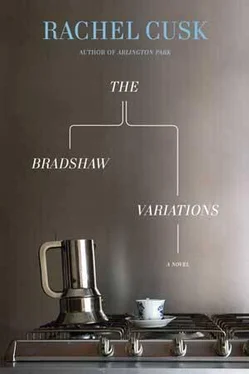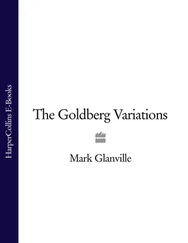But looking at him now, she feels the sheen coming off him. She feels the first disintegration of the surface. In the end, she wants him to be destroyed. The reality of the root, of its deep and primary confusion, requires it.
When it is time to go, Mrs Swann draws her daughter aside.
‘You’ve got very thin,’ she says. ‘You look tired. I hope you’re looking after yourself.’
Antonia’s black trousers are tight-fitting, impossibly minute. Mrs Swann remembers, years ago, an afternoon spent in Antonia’s room when she was out; remembers taking clothes from her daughter’s drawers, shirts and trousers and dresses, and forcing her own mottled arms and legs into them. She was so very large, as she still is today. She remembers laughing, at the trousers that wouldn’t go past her knee, at the shirtsleeves her hands could barely worm through.
Antonia looks surprised. ‘I’m fine,’ she says. ‘I feel good.’
Suddenly Mr Swann is by her side. If she could have got him there by magic, he couldn’t have appeared at a better time.
‘You mustn’t let the responsibility wear you out,’ Mrs Swann says. ‘I’m just saying, Richard, that Antonia looks very tired, very worn.’
Mr Swann looks stricken, in his rigid, metallic way. She makes a mental note, to encourage him to change his glasses. The steel frames have a touch of the robot about them. She envisages him in tortoiseshell, something more modern and forgiving.
‘We should have a talk,’ he says to Antonia. ‘Your mother and I have — well, let’s just call them concerns. We think you and Thomas may be making a serious error. We’ll talk in a few days’ time. Please just hear us out.’
Mrs Swann couldn’t have put it better herself.
Antonia looks troubled. ‘All right,’ she says. ‘But I’m fine, honestly.’
In the car on the way home, the Swanns talk everything over. They pick through every strand of the afternoon. By the time they arrive, they have analysed the situation so thoroughly that no further need to discuss it with Antonia herself remains. In bed, in the dark, Mrs Swann lies awake for a few minutes, putting together the story of their visit to Montague Street. There is a word she needs that is the key to it all, a word she has heard several times lately and not entirely understood. But she feels confident that this story will explain the word, or the other way around, when she comes to tell it. She grasps and grasps and finally lays her hand on it. Househusband . She is satisfied. She closes her eyes, and feels herself grow smaller and smaller until she disappears.
At first he doesn’t miss Alexa. One minute she is there, standing at the door in her school uniform, and the next she is gone, non-existent, just as she used to be when Thomas was at work. He barely thinks of her when she is at school. There are two realities, one where she exists and another, unrelated, that he occupies alone. Then, at four o'clock, she reappears at the door, slightly scuffed, estrangement filming her features, and their life together resumes.
One day, in the middle of the morning, Thomas finds himself searching his mind for the moment of her departure. At breakfast she had complained that her stomach hurt. He dimly recalls her face, wan and drooping, but after that all he can remember is his own determination to send her to school. It is as though his will were a loud sound that has drowned out everything else. Why did he want her to go so much? He doesn’t exactly know. He wonders now what the trouble was. He wishes to reconstruct it, Alexa’s stomach ache, her experience of the hour they spent together, her reluctant passage out of the house, but there is only himself, crashing above everything like a symphony. At half past three he doesn’t wait for Georgina to bring her home. He goes and collects her himself.
Sometimes, standing in the tarmacked playground, he is enveloped in vague feelings of beneficence and sympathy, almost of sadness. Usually he is early: the children have not yet come out. The bright geometric climbing frames, the empty sandpit, the neat, indestructible shrubs in the flower beds seem so familiar to him. He appears to be remembering them, and yet here they are before his eyes. It is as though he is observing them from a strange afterlife. This, he realises, is where Alexa spends the majority of her waking hours.
Other people arrive; he begins to hear the mutter of conversation, babies’ cries, the shouts of small children. He has noticed that the levels of ambient noise in the playground make a virtually unimpeded ascent from piano to fortissimo in the half-hour that he is there. There is always a moment at which he is no longer able to distinguish one sound from another. It is this loss of the power of individuation that makes him feel unreal. He needs Alexa to come out; he needs something he can identify, in order to exist again. Little benches stand around the perimeter and he sits on one. He hums the adagio . He taps his fingers on his thighs.
In a jug on the kitchen table there are yellow roses. Thomas put them there. They catch his eye every time he passes, a yellow sunburst in the shadowy depths of the downstairs room.
He tries to remember what month it is. The yellow colour of the roses makes him think of summer, but the surrounding light is grey and surrendered, as though it is ready at any moment to give in to darkness. He laughs aloud — it is funny, that he doesn’t know what month it is. He says the names of the months to himself. No one name means more to him than any other. For a second he is not even sure which part of time he is in, whether the incipient darkness is rising or ebbing, whether it is day that is to come or night. He looks at his watch; he remembers that it is Thursday, that it is January. He feels better. He has accomplished a small but necessary task, something to make himself more comfortable. The year is an event he is observing, not participating in, like an audience watching a play. He has made himself comfortable in the audience, comfortable in its lack of ambition, but occasionally he is seized by anxiety, torn unexpectedly out of himself, like a small unwary creature suddenly gripped in the talons of a predator. There is something defenceless about his position. There is a vulnerability that comes with the lack of participation. Anxiety can swoop down on him at any time and bear him away.
He decides to go running. He sees Alexa to school and then he runs away into the morning, running along the pavements, along the residential roads towards the park. He does this every day. At the end of a week his body feels prouder, more assertive. He is filled with a tension-like expectation that is never acknowledged or resolved, but passes into the expenditure of the next day’s run. He feels the tension, and he feels the relief of its expenditure. The roses turn brown around their yellow hearts.
*
One day Tonie returns to the house in the middle of the afternoon. There has been a fire in the computer rooms and the university buildings have been evacuated. She comes in with her bag full of files, charged with a dangerous, unspent energy.
Thomas is sitting at the piano. He is learning the C major fugue of The Well-Tempered Clavier . The prelude is easy, but the fugue is defeating him. He can play the left hand and he can play the right hand, but when he tries to play them together he encounters an absolute deficiency in himself. The problem is that the hands are equal. In every other piece Thomas has played, the right hand has been dominant: he has come to depend on the leadership of the right hand, to identify with it, as he might identify with the hero of a novel. Usually, the left hand is purely supportive, making no particular sense on its own. But in the fugue the left hand is autonomous.
Читать дальше












